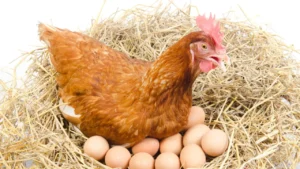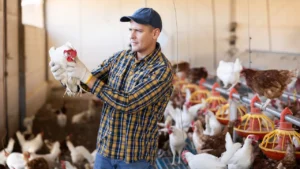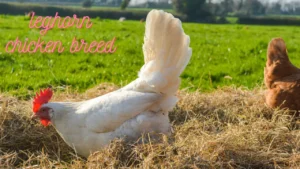When people ask how long chickens live, I always think about my current flock of Happy Roxanne and Reba who have been with me for over 5 ½ years. These wonderful pets bring so much joy to my life, and I’ve grown attached to them. The average lifespan of a chicken is usually between 5 and 10 years, depending on factors like genetics, diet and care.
While chickens in commercial settings often face shorter lifespans my backyard hens continue to provide delicious eggs well into their later years. Watching them forage take dust baths and care for their nests has made me realize just how rewarding it is to have these incredible gentle creatures as part of my life.
How Long Do Chickens Live?
Chickens typically live between 5 to 10 years, but their lifespan varies based on breed, genetics, environment and care. Backyard chickens, protected from predators and given proper shelter, can live a decade or more.
However, chickens raised in commercial settings for egg or meat production often have shorter lifespans around 2-3 years, as they are culled once their production declines.
Key Factors Affecting Chicken Lifespan
Several factors influence a chicken’s lifespan:
-
Breed and Genetics
Different breeds have varying lifespans. For example ISA Browns tend to live around 2-3 years, while Leghorns also have a shorter lifespan of about 4-6 years. Heritage breeds like Plymouth Rock, Orpington, and Easter Eggers tend to live closer to 8-10 years. Slower-growing, heritage breeds are generally more resilient and tend to live longer.
-
Diet and Exercise
A balanced, nutritious diet is crucial. Free-ranging chickens benefit from natural food and exercise leading to better health and longevity. In contrast, chickens raised in confined spaces with poor diets are more prone to health issues and shorter lifespans.
-
Environmental Factors
Chickens raised in clean fresh-air environments with access to outdoor spaces tend to develop stronger immune systems. In contrast, those kept in overcrowded or stressful environments are at greater risk of health problems shortening their lifespan.
-
Veterinary Care and Disease Prevention
Proper veterinary care ensures a longer healthier life. Diseases like Marek’s disease, Mycoplasma gallisepticum and parasites can significantly reduce a chicken’s lifespan if left untreated. Ensuring chickens receive prompt medical attention and biosecurity measures is essential for maintaining their health.
My Backyard Flock: A Variety of Chicken Breeds
In my backyard, I’ve got a wonderful flock of chickens with a mix of heritage and hybrids. While I don’t have any landrace breeds yet, I’d love to add Swedish Flower Hens to my collection. One interesting addition to my flock is Doug, a Cornish Cross Hen who we initially thought was a Leghorn rooster as a chick. Doug has been living with my other laying hens for over 4 years old which isn’t common but it’s definitely fun to see.
There’s such a variety of breeds in my flock, each with their own personality and story. Some may be a bit confusing at first but once they start to live in the flock they fit right in creating a happy and different dynamic. My sister has also added to the mix naming her chicken in a way that always brings a smile. It’s amazing how the age and names of each chicken reflect their role in the flock.
How Long Do Chickens Lay Eggs?

Chickens typically start laying eggs between 16-24 weeks of age. For the first two years, they are at their peak production often laying six eggs weekly which adds up to almost 300 eggs per year depending on the breed. After this time, their egg-laying starts to gradually decrease. By two years old a hen will produce about 80 percent of what she laid in her first year and by three years old, this drops to about 70 percent. By the fourth year, a hen may only lay around 60 percent of her initial egg count. For example, Plymouth Rock hens can continue producing eggs for 8-10 years.
As chickens age, their egg size tends to increase, but the egg count decreases. Some hens may continue producing eggs well into their older years, with many slowing down or stopping by 6-7 years old. However, hens can live several more years after they stop laying eggs with an average life expectancy of 8-10 years. The world’s oldest chicken, an Old English Game hen named Matilda lived to be an impressive 16 years old.
How long do chickens live in the wild?
When it comes to chickens living in the wild their lifespan can be quite different from their domestic counterparts. In the wild chickens have the freedom to roam and experience life in the great outdoors, which is often a healthier environment. They can live anywhere between three years to seven years and sometimes even longer if they’re fortunate.
Unlike domestic chickens wild chickens face numerous challenges, like the risk of predators but they benefit from the ability to raise their young in a natural setting, alongside their families and friends. The majority of chickens in the world today, however, are raised for commercial purposes and are far removed from this diversity of experiences. Despite the dangers in the wild, these lucky individuals often outlive many of their domestic counterparts due to their natural surroundings and lifestyle.
What do chickens usually die from?

In the United States, billions of chickens are bred, raised and killed each year. The majority of these chickens are not wild, and only a small percentage live in backyard flocks. Unfortunately the leading cause of death for chickens is slaughter by humans.
Most chickens are raised in intensive agriculture operations, such as factory farms, where they are raised primarily for eggs or meat. This method of farming means that each year countless chickens are killed to meet the demands for these products.
Which chicken holds the world record for the longest life span?
The world’s oldest chicken named Matilda was a true exception in the poultry world. She was an Old English Game breed and was not raised on a factory farm. Instead, she was kept as a companion bird and achieved a remarkable age of 16 years.
Unlike a typical layer hen which has a two-year lifespan or a broiler chicken often living under two months Matilda never produced eggs which likely contributed to her long life. Her extraordinary lifespan highlights the cruelty of commercial industries where the stark contrast in their conditions makes this longevity even more obvious.
How Can I Help My Chicken Live Longer?
Understanding your chicken’s needs is the first step to help them live their best lives. By making simple choices like ensuring proper nutrition choosing a well-designed coop treating common parasites and recognizing potential predators you can greatly improve their health and overall life expectancy. Whether you have hens or roos the right care ensures a happier, healthier longer life for them. Researching and taking the time to learn about their breed temperament and daily routines can also provide invaluable insights.
As a pet parent, I’ve experienced the panic of late-night internet searches for quick fixes when noticing a funny limp or uneaten dinner. But starting your chicken-keeping journey right investing in suitable housing, feed brands and expert advice saves money and offers peace of mind. Avoid the costly cycle of replacing unsuitable solutions or even swapping an ill chicken like Henrietta for a convincing cluckalike. Instead, rely on knowledge, common sense and experience to provide the best care possible. Helping chickens live longer is not just about effort; it’s about smart thoughtful choices.
FAQs
How long do chickens typically live?
Chickens usually live between 5 to 10 years, depending on their breed, care and living conditions. Some chickens especially heritage breeds can live even longer.
Do chickens live longer in flocks or alone?
Chickens tend to live longer when kept in flocks as they feel safer and less stressed. However, they can also thrive as individuals if given proper attention and care.
How can I tell if my chicken is getting old?
Signs of aging in chickens include reduced egg production, slower movements and changes in their comb color or overall health. Regular health checks can help monitor their well-being.
Do chickens age slowly or quickly?
Chickens age relatively quickly compared to some other animals, with noticeable changes in their health and behavior after just a few years. Regular monitoring is essential as they grow older.
Can I prevent diseases to help my chicken live longer?
Yes, keeping your chicken’s environment clean, vaccinating them and managing their diet and stress levels can prevent many diseases which can help increase their lifespan. Regular vet check-ups are also recommended.
Conclusion
In conclusion, the lifespan of chickens can vary widely depending on factors like breed diet living conditions and overall care. On average, chickens live between 5 to 10 years with some heritage breeds living even longer. By providing proper nutrition a safe environment and regular health checks you can significantly increase your chicken’s longevity and quality of life. Whether you keep chickens for eggs, companionship or as pets ensuring their well-being is key to helping them live a long happy life.












